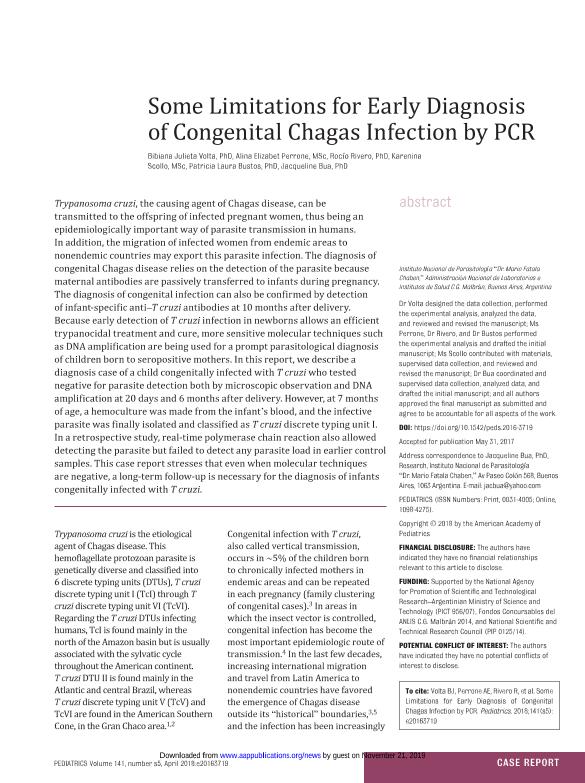Artículo
Some limitations for early diagnosis of congenital chagas infection by PCR
Volta, Bibiana Julieta ; Perrone, Alina Elizabeth
; Perrone, Alina Elizabeth ; Rivero, Rocío
; Rivero, Rocío ; Scollo, Karenina; Bustos, Patricia Laura
; Scollo, Karenina; Bustos, Patricia Laura ; Bua, Jacqueline Elena
; Bua, Jacqueline Elena
 ; Perrone, Alina Elizabeth
; Perrone, Alina Elizabeth ; Rivero, Rocío
; Rivero, Rocío ; Scollo, Karenina; Bustos, Patricia Laura
; Scollo, Karenina; Bustos, Patricia Laura ; Bua, Jacqueline Elena
; Bua, Jacqueline Elena
Fecha de publicación:
04/2018
Editorial:
American Academy of Pediatrics
Revista:
Pediatrics
ISSN:
0031-4005
Idioma:
Inglés
Tipo de recurso:
Artículo publicado
Clasificación temática:
Resumen
Trypanosoma cruzi, the causing agent of Chagas disease, can be transmitted to the offspring of infected pregnant women, thus being an epidemiologically important way of parasite transmission in humans. In addition, the migration of infected women from endemic areas to nonendemic countries may export this parasite infection. The diagnosis of congenital Chagas disease relies on the detection of the parasite because maternal antibodies are passively transferred to infants during pregnancy. The diagnosis of congenital infection can also be confirmed by detection of infant-specific anti-T cruzi antibodies at 10 months after delivery. Because early detection of T cruzi infection in newborns allows an efficient trypanocidal treatment and cure, more sensitive molecular techniques such as DNA amplification are being used for a prompt parasitological diagnosis of children born to seropositive mothers. In this report, we describe a diagnosis case of a child congenitally infected with T cruzi who tested negative for parasite detection both by microscopic observation and DNA amplification at 20 days and 6 months after delivery. However, at 7 months of age, a hemoculture was made from the infant's blood, and the infective parasite was finally isolated and classified as T cruzi discrete typing unit I. In a retrospective study, real-time polymerase chain reaction also allowed detecting the parasite but failed to detect any parasite load in earlier control samples. This case report stresses that even when molecular techniques are negative, a long-term follow-up is necessary for the diagnosis of infants congenitally infected with T cruzi.
Archivos asociados
Licencia
Identificadores
Colecciones
Articulos(SEDE CENTRAL)
Articulos de SEDE CENTRAL
Articulos de SEDE CENTRAL
Citación
Volta, Bibiana Julieta; Perrone, Alina Elizabeth; Rivero, Rocío; Scollo, Karenina; Bustos, Patricia Laura; et al.; Some limitations for early diagnosis of congenital chagas infection by PCR; American Academy of Pediatrics; Pediatrics; 141; 5; 4-2018; 451-455
Compartir
Altmétricas



